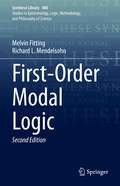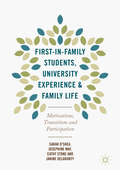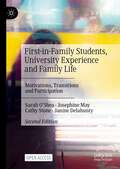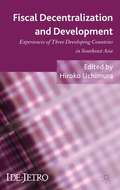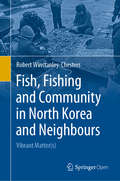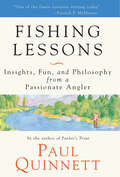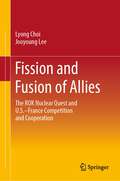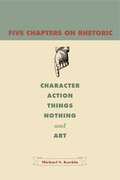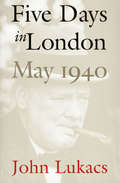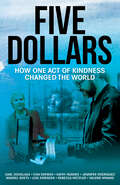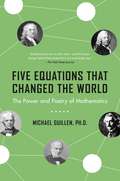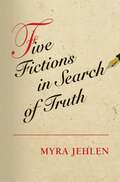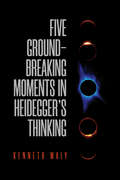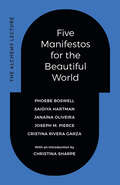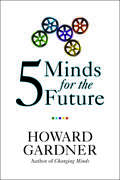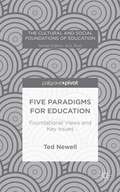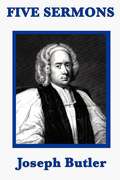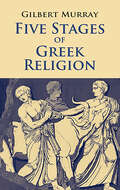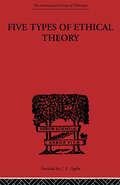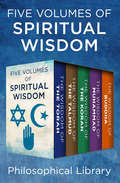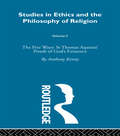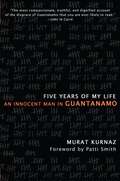- Table View
- List View
First-Order Modal Logic (Synthese Library #480)
by Melvin Fitting Richard L. MendelsohnThis is a thorough treatment of first-order modal logic. The book covers such issues as quantification, equality (including a treatment of Frege's morning star/evening star puzzle), the notion of existence, non-rigid constants and function symbols, predicate abstraction, the distinction between nonexistence and nondesignation, and definite descriptions, borrowing from both Fregean and Russellian paradigms.
First-in-Family Students, University Experience and Family Life
by Sarah O'Shea Josephine May Cathy Stone Janine DelahuntyThis book examines the university experiences of first-in-family university students, and how these students' decisions to return to education impact upon their family members and significant others. While it is well known that parental educational background has a substantial impact on the educational levels of family and dependents, it is unclear how attending university as a first-in-family student translates into the family and community of the learner. With the continuing requirements for higher education institutions to increase the participation of students from a range of diverse backgrounds and educational biographies, this is a major gap in understanding that needs to be addressed. Exploring how this university participation is understood at an individual, familial and community level, this book provides valuable insights into how best to support different student requirements. This book will be of great interest to students and researchers in the fields of education and sociology, as well as policy-makers in education and diversity initiatives.
First-in-Family Students, University Experience and Family Life: Motivations, Transitions and Participation
by Sarah O'Shea Josephine May Cathy Stone Janine DelahuntyThis open access book, now in its second edition, offers a comprehensive overview of the experiences of First in Family (FiF) or first-generation students in higher education. It draws upon narratives of students and their family members and spans the entire university student life cycle (pre-entry, commencement, progression and graduation) with a focus on specific cohorts including mature-aged students, parents or carers, as well as the differentiated experiences of male and female learners. With research drawn from three major research projects and including over 650 FiF students from across all Australian states and territories, as well as Europe, this wealth of perspectives provides unique insights into the lived reality of attending university in contemporary higher education settings. The book is written for a broad audience and will appeal to those working in universities, as well as family members and students who may be contemplating participating in higher education.
Fiscal Decentralization and Development
by Hiroko UchimuraAn in-depth analysis of the fundamental role that decentralization plays in developing countries, using detailed statistical data to examine the actual fiscal structure between tiers of government, and the effects of decentralization at the local, national and international levels.
Fish, Fishing and Community in North Korea and Neighbours: Vibrant Matter(s)
by Robert Winstanley-ChestersThis open access book explores the histories and geographies of fishing in North Korea and the surrounding nations. With the ideological and environmental history of North Korea in mind, the book examines the complex interactions between local communities, fish themselves, wider ecosystems and the politics of Pyongyang through the lens of critical geography, fisheries statistics and management science as well as North Korean and more generally Korean and East Asian studies. There is increasing global interest in North Korea, its politics, people and landscapes, and as such, this book describes encounters with North Korean fishing communities, as well as unusual moments in the field in the People’s Republic of China, the Russian Federation and the Republic of Korea (South Korea). It addresses fish, fishing infrastructure, fishing science and fishing statistics and other non-human elements of North Korean and other nations’ developmental regimes as actors and participants within them as much as humans and their technologies. The book enables readers to gain extensive insights into the aspirations and practices of fishing in North Korea and its neighbours, the navigation of difficult political and developmental situations and changing ecological realities in a time of environmental and climate crisis familiar to many across the globe.
Fishing Lessons: Insights, Fun, and Philosophy from a Passionate Angler
by Paul QuinnettWith honesty, wit and erudition, the acclaimed author of Pavlov’s Trout delves into the philosophical lessons learned from a lifetime of fishing.Despite its title, Fishing Lessons will not show readers how to fish. In fact, you don't even have to like to fish to enjoy and appreciate the latest book from renowned psychologist, fisherman, and essayist Paul Quinnett. Fishing Lessons is a rich mix of anecdotes, observations, essays, short stories, one-liners, and personal revelations from Quinnett's rich life and fishing journals. In his straightforward style, Quinnett rounds out the trilogy that began with Pavlov's Trout and Darwin's Bass, the first books ever written on the psychology of fishing. This time he tackles the philosophy of fishing—a philosophy of enjoying life. Over the course of its pages, Fishing Lessons provides satisfying essays that won't so much teach you about fishing as they will teach you about yourself.
Fishing in Contested Waters
by Sarah KingAfter the Supreme Court of Canada's 1999 Marshall decision recognized Mi'kmaw fishers' treaty right to fish, the fishers entered the inshore lobster fishery across Atlantic Canada. At Burnt Church/Esgenoôpetitj, New Brunswick, the Mi'kmaw fishery provoked violent confrontations with neighbours and the Canadian government. Over the next two years, boats, cottages, and a sacred grove were burned, people were shot at and beaten, boats rammed and sunk, roads barricaded, and the local wharf occupied.Based on 12 months of ethnographic field work in Burnt Church/Esgenoôpetitj, Fishing in Contested Waters explores the origins of this dispute and the beliefs and experiences that motivated the locals involved in it. Weaving the perspectives of Native and non-Native people together, Sarah J. King examines the community as a contested place, simultaneously Mi'kmaw and Canadian. Drawing on philosophy and indigenous, environmental, and religious studies, Fishing in Contested Waters demonstrates the deep roots of contemporary conflicts over rights, sovereignty, conservation, and identity.
Fission and Fusion of Allies: The ROK Nuclear Quest and U.S.–France Competition and Cooperation
by Jooyoung Lee Lyong ChoiThis book traces the development of U.S-led global nuclear non-proliferation diplomacy during the three decades since the Eisenhower’s “Atoms for Peace” in 1953. The U.S. non-proliferation efforts had diverse obstacles. It had to prevent nuclear states’ export of nuclear technology while dissuading non-nuclear states from developing nuclear weapons. In addition, building non-proliferation regime was not always its top foreign policy priority. To understand the complex process of non-proliferation, the book examines the relations among three different actors in the nuclear field: a global non-proliferation regime builder (U.S.), a potential nuclear proliferator (France) and a would-be nuclear state (Republic of Korea). In tracing how they developed nuclear strategies, conflicting and compromising with one another, the book pays special attention to how the transforming Cold War structure in the 1970s not only affected foreign policies of the involved countries but also complicated their relationship. The exploration ultimately highlights the multidimensional nature of international discussion on nuclear non-proliferation as the ROK’s nuclear development attempts, U.S. non-proliferation efforts, and the U.S.-France nuclear technology cooperation in the 1970s were all deeply connected.
Five Chapters on Rhetoric: Character, Action, Things, Nothing, and Art
by Michael S. KochinMichael Kochin’s radical exploration of rhetoric is built around five fundamental concepts that illuminate how rhetoric functions in the public sphere. To speak persuasively is to bring new things into existence—to create a political movement out of a crowd, or an army out of a mob. Five Chapters on Rhetoric explores our path to things through our judgments of character and action. It shows how speech and writing are used to defend the fabric of social life from things or facts. Finally, Kochin shows how the art of rhetoric aids us in clarifying things when we speak to communicate, and helps protect us from their terrible clarity when we speak to maintain our connections to others.Kochin weaves together rhetorical criticism, classical rhetoric, science studies, public relations, and political communication into a compelling overview both of persuasive strategies in contemporary politics and of the nature and scope of rhetorical studies.
Five Chapters on Rhetoric: Character, Action, Things, Nothing, and Art (G - Reference, Information and Interdisciplinary Subjects)
by Michael S. KochinMichael Kochin’s radical exploration of rhetoric is built around five fundamental concepts that illuminate how rhetoric functions in the public sphere. To speak persuasively is to bring new things into existence—to create a political movement out of a crowd, or an army out of a mob. Five Chapters on Rhetoric explores our path to things through our judgments of character and action. It shows how speech and writing are used to defend the fabric of social life from things or facts. Finally, Kochin shows how the art of rhetoric aids us in clarifying things when we speak to communicate, and helps protect us from their terrible clarity when we speak to maintain our connections to others.Kochin weaves together rhetorical criticism, classical rhetoric, science studies, public relations, and political communication into a compelling overview both of persuasive strategies in contemporary politics and of the nature and scope of rhetorical studies.
Five Days in London, May 1940: May 1940
by John LukacsA &“gripping [and] splendidly readable&” portrait of the battle within the British War Cabinet—and Churchill&’s eventual victory—as Hitler&’s shadow loomed (The Boston Globe). From May 24 to May 28, 1940, members of Britain&’s War Cabinet debated whether to negotiate with Hitler or to continue what became known as the Second World War. In this magisterial work, John Lukacs takes us hour by hour into the critical events at 10 Downing Street, where Winston Churchill and his cabinet painfully considered their responsibilities. With the unfolding of the disaster at Dunkirk, and Churchill being in office for just two weeks and treated with derision by many, he did not have an easy time making his case—but the people of Britain were increasingly on his side, and he would prevail. This compelling narrative, a Washington Post bestseller, is the first to convey the drama and world-changing importance of those days. &“[A] fascinating work of historical reconstruction.&”—The Wall Street Journal &“Eminent historian Lukacs delivers the crown jewel to his long and distinguished career.&”—Publishers Weekly (starred review) &“A must for every World War II buff.&”—Cleveland Plain Dealer &“Superb…can be compared to such classics as Hugh Trevor-Roper&’s The Last Days of Hitler and Barbara Tuchman&’s The Guns of August.&”—Harper&’s Magazine
Five Dollars: How One Act of Kindness Changed the World
by Eight AuthorsDiscover the transformative power of a single act of kindness in Five Dollars: How One Act of Kindness Changed the World. This heartwarming and inspiring novel follows the remarkable journey of a five-dollar bill as it travels through the hands of diverse individuals, sparking a global movement of generosity and compassion. From a struggling family man and a devoted parishioner to a reformed criminal and an elderly woman finding new purpose, each character's story weaves into a tapestry of interconnected lives. As small acts of kindness ripple outwards, they create profound change in communities, overcoming skepticism, resistance, and even corruption. Five Dollars is a testament to the enduring impact of human kindness and a powerful reminder that even the smallest gestures can unite us, transform lives, and create a brighter, more compassionate world. Join this extraordinary journey and be inspired to believe in the boundless potential of goodwill and the remarkable difference each of us can make.
Five Equations That Changed the World: The Power and Poetry of Mathematics
by Michael GuillenA Publishers Weekly best book of 1995! Dr. Michael Guillen, known to millions as the science editor of ABC's Good Morning America, tells the fascinating stories behind five mathematical equations. As a regular contributor to daytime's most popular morning news show and an instructor at Harvard University, Dr. Michael Guillen has earned the respect of millions as a clear and entertaining guide to the exhilarating world of science and mathematics. Now Dr. Guillen unravels the equations that have led to the inventions and events that characterize the modern world, one of which -- Albert Einstein's famous energy equation, E=mc2 -- enabled the creation of the nuclear bomb. Also revealed are the mathematical foundations for the moon landing, airplane travel, the electric generator -- and even life itself. Praised by Publishers Weekly as "a wholly accessible, beautifully written exploration of the potent mathematical imagination," and named a Best Nonfiction Book of 1995, the stories behind The Five Equations That Changed the World, as told by Dr. Guillen, are not only chronicles of science, but also gripping dramas of jealousy, fame, war, and discovery.
Five Essays on Philosophy
by Mao Tse-TungOriginally published in China in 1966, this book contains five essays on philosophy by Mao Tse-tung.
Five Fictions in Search of Truth
by Myra JehlenFiction, far from being the opposite of truth, is wholly bent on finding it out, and writing novels is a way to know the real world as objectively as possible. In Five Fictions in Search of Truth, Myra Jehlen develops this idea through readings of works by Flaubert, James, and Nabokov. She invokes Proust's famous search for lost memory as the exemplary literary process, which strives, whatever its materials, for a true knowledge. In Salammbô, Flaubert digs up Carthage; in The Ambassadors, James plumbs the examined life and touches at its limits; while in Lolita, Nabokov traces a search for truth that becomes a trespass. In these readings, form and style emerge as fiction's means for taking hold of reality, which is to say that they are as epistemological as they are aesthetic, each one emerging by way of the other. The aesthetic aspects of a literary work are just so many instruments for exploring a subject, and the beauty and pleasure of a work confirm the validity of its account of the world. For Flaubert, famously, a beautiful sentence was proven true by its beauty. James and Nabokov wrote on the same assumption--that form and style were at once the origin and the confirmation of a work's truth. In Five Fictions in Search of Truth, Jehlen shows, moreover, that fiction's findings are not only about the world but immanent within it. Literature works concretely, through this form, that style, this image, that word, seeking a truth that is equally concrete. Writers write--and readers read--to discover an incarnate, secular knowledge, and in doing so they enact a basic concurrence between literature and science.Some images inside the book are unavailable due to digital copyright restrictions.
Five Ground-Breaking Moments in Heidegger’s Thinking (New Studies in Phenomenology and Hermeneutics)
by Kenneth MalyFive Groundbreaking Moments in Heidegger’s Thinking presents a fresh interpretation of some of Heidegger’s most difficult but important works, including his second major work, Beiträge zur Philosophie (Vom Ereignis) [Contributions to Philosophy (From Enowning)]. The careful approach shows how, for Heidegger, the acts of reading, thinking, and saying all move beyond the theoretical/conceptual and become an ongoing experience. In new translations of central texts, Kenneth Maly invites the reader to think along the way by reading, contemplating, and translating Heidegger’s ideas into this context. An introduction to the field of philosophy and more specifically to Heidegger’s thought, Five Groundbreaking Moments in Heidegger’s Thinking asks the reader, in some manner, to actively engage in thinking.
Five Manifestos for the Beautiful World: The Alchemy Lecture
by Saidiya Hartman Cristina Rivera Garza Joseph M. Pierce Phoebe Boswell Janaína OliveiraThe second annual Alchemy Lecture brought together five artists, thinkers, and writers who proposed new ways of being and discussed radical visions for the future. Five Manifestos for the Beautiful World captures and expands these lectures to illuminate our path toward this possible beautiful world. Joseph M. Pierce (Cherokee Nation) asserts that “for this decolonial future to become possible, the guiding force must no longer be capital but relations.” Film curator Janaína Oliveira (Brazil) evokes music and movement as a means toward this relationality. Visual artist Phoebe Boswell (UK/Kenya) asks, “If we burn down the institution, what happens next?” Saidiya Hartman (US) prompts us to consider our capacity to burn, examining whether “the gift of pragmatism yields a profound tolerance of the unlivable.” Cristina Rivera Garza (US/Mexico) gives us the language of the future in the subjunctive, “the smuggler who crosses the border of the future bearing unknown cargo.” Each alchemist is intimately concerned with this cargo, our ability to bear its weight, and how we might find the beautiful world together.
Five Minds for the Future
by Howard GardnerWe live in a time of relentless change. The only thing that?s certain is that new challenges and opportunities will emerge that are virtually unimaginable today. How can we know which skills will be required to succeed?In Five Minds for the Future, bestselling author Howard Gardner shows how we will each need to master "five minds" that the fast-paced future will demand:· The disciplined mind, to learn at least one profession, as well as the major thinking (science, math, history, etc.) behind it· The synthesizing mind, to organize the massive amounts of information and communicate effectively to others· The creating mind, to revel in unasked questions - and uncover new phenomena and insightful apt answers· The respectful mind, to appreciate the differences between human beings - and understand and work with all persons· The ethical mind, to fulfill one's responsibilities as both a worker and a citizenWithout these "minds," we risk being overwhelmed by information, unable to succeed in the workplace, and incapable of the judgment needed to thrive both personally and professionally.Complete with a substantial new introduction, Five Minds for the Future provides valuable tools for those looking ahead to the next generation of leaders - and for all of us striving to excel in a complex world.Howard Gardner-cited by Foreign Policy magazine as one of the one hundred most influential public intellectuals in the world, and a MacArthur Fellowship recipient-is the Hobbs Professor of Cognition and Education at the Harvard Graduate School of Education.
Five Paradigms for Education: Foundational Views and Key Issues
by Ted NewellNewell compares the fundamental assumptions of five major worldviews of education and their implications for classroom practice, incorporating history and case studies and posing questions about the limits and benefits of employing each today.
Five Sermons
by Joseph ButlerJoseph Butler was an English bishop, theologian, apologist, and philosopher. He was born in Wantage in the English county of Berkshire. He is known, among other things, for his critique of Thomas Hobbes's egoism and John Locke's theory of personal identity. During his life and after his death, Butler influenced many philosophers, including David Hume, Thomas Reid, and Adam Smith
Five Stages of Greek Religion: The History Of The Olympian Gods Of Ancient Greece (hardcover)
by Gilbert MurrayBeginning with Greece's earliest rites, this volume traces the development of the classic religion of the Olympian gods and discusses the religion of the philosophic schools of the fourth century BC. It portrays the emergence of Christianity and concludes with an account of the efforts of Julian the Apostate to restore a new variety of paganism.
Five Types of Ethical Theory (International Library of Philosophy)
by C.D. BroadIn this book, Broad expounds and criticises five typical theories of ethics, viz. those of Spinoza, Butler, Hume, Kant and Sidgwick. This edition first published in 2000. Routledge is an imprint of Taylor & Francis, an informa company.
Five Volumes of Spiritual Wisdom: The Wisdom of the Torah, The Wisdom of the Talmud, The Wisdom of the Koran, The Wisdom of Muhammad, and The Wisdom of Buddha (Wisdom)
by The Wisdom SeriesA stunning collection of ancient wisdom featuring powerful insights from five of the world&’s most influential religions.The Wisdom of the Torah is an instruction in the central beliefs of three world religions: Judaism, Christianity, and Islam. But by observing the Torah, or the Hebrew Bible, as a collected work of multiple authors spanning generations, the modern reader can look beyond its fundamental instruction. In these works, readers find many lyrical and timeless reflections on what it means to have faith and to be a member of the human race. The Wisdom of the Talmud presents a thorough history and overview of the Talmud, the rabbinical commentary on the Torah that was developed in the Jewish academies of Palestine and Babylonia. From man&’s purpose and miracles to marriage and wellness to consciousness and community, the Talmud considers what it means to practice faith on a daily basis and through a changing world. In The Wisdom of the Koran, readers will discover a selection of key chapters such as &“The Night Journey&” and &“The Cave,&” footnotes to convey context and meaning, as well as several stories from Judeo-Christian history. This invaluable anthology is an excellent step toward greater understanding of one of the finest pieces of Arabic prose and the Muslim faith. The Wisdom of Muhammad is essential reading for anyone who wants to have a true understanding of Islam, and offers a compelling examination of the life and sayings of the Prophet. Covering a diverse range of topics, from marriage and civic charity to the individual&’s relationship to God and the afterlife, the Prophet&’s words dispel misconceptions about the history of the faith, its leader, and its core beliefs. The Wisdom of Buddha, drawn from the sacred books of Buddhism, reveals the insights and beliefs at the heart of the world&’s fourth-largest religion. Covering the birth and death of the Buddha, as well as the major tenets of Buddhism, this collection offers a profound view of the Buddhist religion and its founder. These five volumes from Philosophical Library&’s groundbreaking Wisdom series are available in one volume for the first time.
Five Ways: St. Thomas Aquinas' Proofs Of God's Existence
by Anthony KennyFirst published in 2003. Routledge is an imprint of Taylor & Francis, an informa company.
Five Years of My Life: An Innocent Man in Guantanamo
by Murat KurnazIn October 2001, nineteen-year-old Murat Kurnaz traveled to Pakistan to visit a madrassa. During a security check a few weeks after his arrival, he was arrested without explanation and for a bounty of $3,000, the Pakistani police sold him to U.S. forces. He was first taken to Kandahar, Afghanistan, where he was severely mistreated, and then two months later he was flown to Guantanamo as Prisoner #61. For more than 1,600 days, he was tortured and lived through hell. He was kept in a cage and endured daily interrogations, solitary confinement, and sleep deprivation. Finally, in August 2006, Kurnaz was released, with acknowledgment of his innocence. Told with lucidity, accuracy, and wisdom, Kurnaz's story is both sobering and poignant--an important testimony about our turbulent times when innocent people get caught in the crossfire of the war on terrorism.
